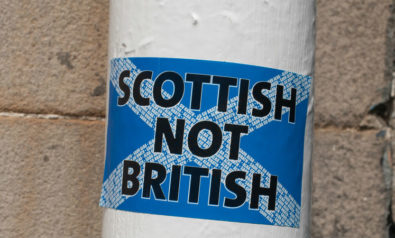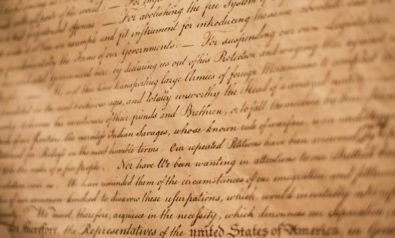While many view the Edinburgh Agreement concessions as a sign of weakness by the Prime Minister, uncertain support for Scottish independence in the absence of a third option might prove a wining point for David Cameron and the Union in 2014.
The Scottish Nationalist Party (SNP) only emerged from the shadow of Labour in 2007, but since assuming its position as Scotland’s premier political force has blazed a trail to what will be the most significant decision made by the Scottish electorate in generations. The ‘Edinburgh Agreement’ signed by Prime Minister David Cameron and First Minister Alex Salmond finally rubber-stamped a referendum on Scottish independence, an issue that has been the crux SNP policy since it came to power.
The agreement was lauded as a major coup for Salmond, with many journalists questioning why Cameron had conceded so many of the First Minister’s terms. Cameron agreed to Salmond’s timescale, setting the date for the referendum far down the line in 2014. The Prime Minister also gave the go-ahead to Salmond’s proposed extension of the electorate to include 16 and 17-year-olds. Salmond had achieved his goal, gaining the devolved powers from Westminster that allows Holyrood to hold a referendum. Dig a little deeper however, and you may come think it was Cameron, not Salmond, who was masking a smile as they emerged from the conference room.
Cameron’s perceived weakness through his concessions was instead just a matter of trading. Having allowed the timescale and age restriction to be set by Salmond, the Prime Minister had the leverage to insist on a single question referendum.
Having a second question would have given the option of Scottish Devo Max, described by SNP MSP Stewart Maxwell as the, “full devolution of all powers with the exception of defence and foreign affairs.” In July, even Salmond gave an indication he favoured a second question on the referendum ballot paper. The First Minister said having all financial matters devolved to Holyrood instead of independence was “a very attractive argument.”
This option would have provided the Scottish electorate with afar easier and far less daunting proposition for those sitting on the fence. It would offer a half way measure. Instead, they are offered an all or nothing option, which may force those of a more tentative disposition to reject the issue altogether.
In June a poll by Ipsos MORI found 56% of Scottish people backed a third option and a clear majority thought Holyrood should take control on tax (57%), the economy (57%), employment law (64%), welfare (67%) and energy (64%). Cameron traded so heavily for a single question referendum because he knew, given the option, Scotland would have no problem voting for more devolved powers.
Despite many SNP members being happy, believing the inclusion of a second question would split their vote and end their hope of full independence; Salmond’s inability to get a second question may equally be viewed as a failure. He failed to get what the electorate really wanted. Instead he gambled that, with the concessions made by Cameron, he could manipulate public opinion and win full independence come 2014.
So were those concessions the First Minister took from the agreement worth bargaining for in the first place? Possibly not.
Ipsos MORI’s October opinion poll shows a decrease in support for independence. Of the 1003 people asked only 30% would vote ‘Yes’ compared to 39% in January. Salmond claims that because the date has been set for 2014 it allows time for this downturn in public opinion to be overturned. Conversely, there must be concern that this is, instead, a signal of things to come. The fact the wind seems to have already left the nationalists sails, so soon after the quest for a referendum was announced, may be a problem exacerbated by the length of time between now and the referendum.
The question of extending the electorate may also be something that comes back to haunt Salmond. As part of the poll only 27% of 18-24-year-olds would choose to vote ‘Yes’. Although the statistics for the newly enfranchised do not exist, there is a pattern of youth being more likely to vote ‘No’. With the modern world becoming more and more a global community, the need for independence may seem lost on them. This is when compared to, what The Times called the ‘Braveheart generation’ of 35-54-year-olds, who topped the poll at 35% in favour. Has Salmond mistakenly enfranchised an age group more likely to reject, rather than support, the movement?
The Prime Minister traded wisely, the concessions he awarded to Salmond may well leave the First Minster hoist by his own petard. On the other hand, his securing of a single question makes ticking the box next to ‘Yes’ all the more daunting for those who simply wish for a less invasive Westminster.
Nevertheless, there are two years to go and plenty of time for Salmond’s bluster to inflate patriotic sentiment and turn the tide in favour of Independence. But their campaign will not run unopposed. Alistair Darling’s ‘Better Together’ campaign will be doing its best to promote the unionist cause. The former Chancellor heads a new cross party campaign promoting the view that ‘Scotland is a better and stronger country as part of the United Kingdom.’
The campaign is careful not to alienate itself, making sure it tows the patriotic line believing Scotland could survive as a separate country. Instead it pushes the notion that despite Scotland’s ability to stand alone successfully, being part of the United Kingdom is the best possible choice for the future. They believe that ‘Scotland is stronger as part of the United Kingdom and that the United Kingdom is stronger with Scotland as a partner.’
Just as it was in the US presidential election, recent politics hangs on one issue in the eye of the electorate: the economy. It is here the ‘Better Together’ campaign feels it can push home its advantage. It stresses that the size, strength and stability of the UK economy is an advantage for Scotland’s businesses and hopes to persuade the electorate that now, given the frightening economic climate, is not the time to go it alone.
A recent study by the Institute for Fiscal Studies (IFS) shows that although the current economic climate may be a daunting time to cut loose from the stability of the UK, years down the line an independent Scotland may face an even bleaker economic situation. The IFS presented research focusing on the economic consequences of Independence. The essence of the paper was independence for short-term gain but with long-term uncertainty.
Public spending per person is £1,200 a year higher in Scotland than in Britain as a whole, a benefit that would be lost as an independent nation. But, assuming an independent Scotland took its geographical share of the North Sea’s raw materials, this higher public spending would be comfortably offset by the source of income, provided by oil and as revenue.
So there it is, the common conception of a match made in Braveheart heaven, Scotland and the North Sea. But, according to the IFS, should be careful not to place all its eggs in one basket. Scotland’s government would be left heavily reliant on North Sea receipts that are expected to remain in long-term decline. The report reads, “If, as is likely, oil and gas revenues fall over the long run, then the fiscal challenge facing Scotland will be greater than that facing the UK.”
Alex Salmond, aiming to exploit the North Sea oil issue as a key battleground of the Independence debate, claims that the industry has a bright future with as much as £1.5 trillion worth of oil remaining to be extracted. Oil and gas extraction supports an estimated 200,000 jobs in Scotland and is a cause for pride and optimism but analysts predict that production will remain in inexorable decline, having plunged by 60 per cent since its peak in 1999.
Scottish Finance Secretary, John Swinney, believes the IFS report proves that Scotland is in a better financial position than the UK. He claimed: “With independence, Scotland will be able to face the difficult financial choices ahead from a stronger position than in the UK and use the full range of economic levers to support growth, boost revenues and deliver public services.”
This is a seemingly narrow-minded approach. The current economic climate is admittedly tough and the problems it poses may well be better combatted by a Scotland in full control of its North Sea revenue. However, relying on a finite source of income and focusing on an economic issue affecting Scotland at present, thereby disregarding the possible economic concerns decades down the line, is short-sighted. Scotland may be a leader in renewable energy and this, together with tourism, will provide a good level of income in the future. But so far the ‘Yes’ campaign has done little to allay fears of whether anything is being done to fill the monetary gap left when the oil runs out.
The report makes unhappy reading for many nationalists hoping to sail off into a happy North Sea sunset. Danny Alexander, the Liberal Democrat Chief Secretary to the Treasury hopes these revelations will help the Unionist cause saying, “I believe Scotland is better off as a vibrant and successful part of the UK, and I hope this report will help persuade the Scottish people that the UK is better together when they vote in 2014.”
The report essentially shows that in the short term Scotland can better prosper in direct control of their oil and gas deposits. But independence is an irreversible beast, asking to be readmitted to the Union when the North Sea runs dry would almost certainly be met with a wry smile and a firm ‘No’.
This should not be a decision based on factors that will best deal with the current economic climate but on what is best for the economy of Scotland for the indefinite future.
The economic outlook for an independent Scotland is not as rosy as Mr. Salmond would have you believe. With the Unionists now able to back up their arguments with empirical data the patriotic sheen to the Nationalist cause seems tarnished. The more information that is revealed, the more nationalist hopes seem to be unravelling before our very eyes, but it’s too late to turn back now.
When Salmond signed on the dotted line in Edinburgh he may well have believed he was writing himself into the history books. With public support in decline and with the SNP unable to offer any substantial response to an influx of bad figures and bad press he may well be entering the history books for all the wrong reasons.
The views expressed in this article are the author’s own and do not necessarily reflect Fair Observer’s editorial policy.
Support Fair Observer
We rely on your support for our independence, diversity and quality.
For more than 10 years, Fair Observer has been free, fair and independent. No billionaire owns us, no advertisers control us. We are a reader-supported nonprofit. Unlike many other publications, we keep our content free for readers regardless of where they live or whether they can afford to pay. We have no paywalls and no ads.
In the post-truth era of fake news, echo chambers and filter bubbles, we publish a plurality of perspectives from around the world. Anyone can publish with us, but everyone goes through a rigorous editorial process. So, you get fact-checked, well-reasoned content instead of noise.
We publish 2,500+ voices from 90+ countries. We also conduct education and training programs
on subjects ranging from digital media and journalism to writing and critical thinking. This
doesn’t come cheap. Servers, editors, trainers and web developers cost
money.
Please consider supporting us on a regular basis as a recurring donor or a
sustaining member.
Will you support FO’s journalism?
We rely on your support for our independence, diversity and quality.













Comment